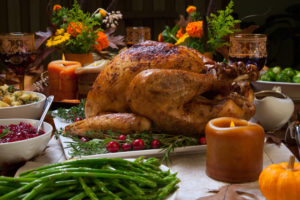
Because of the COVID-19 pandemic, Thanksgiving 2020 will look very different from normal. Most of us will have a much smaller gathering than we usually do. One thing that probably won’t change, though, is that we’ll carefully skirt around discussions of politics. The fault lines that divide our nation run through families, churches, workplaces, and circles of friends.
Regardless of how you voted, you’re most likely happy about some of this month’s election results and disappointed in others. You probably know people—even family or close friends—who voted differently from you. And no doubt they feel just as strongly about their views as you do about yours. It doesn’t help that many Americans see those who voted differently not as merely mistaken or wrongheaded, but evil. That can make family gatherings—especially those involving liberal consumption of alcohol—potentially explosive.
Two questions for Thanksgiving 2020
Last month the American Concrete Institute held its fall convention virtually. Some of us were in Dubai, others in Australia or the UK, and others all around the US. Even so, participating in the committee meetings remotely was remarkably smooth. It may not have been as satisfying as an in-person convention, but we were able to make progress on our committee work.
For me the most memorable event was the keynote speech by Kevin Brown, who spoke about what he calls the hero effect. According to Brown, heroes help people with no strings attached. That is, they aren’t thinking about being able to call in favors from them at some later time, as if it were a transaction. Instead, they just help. They also view life—and other people—with optimism.
Brown posed two questions for us to think about:
- Can you look in the mirror and see the faces of the people who made you a better person?
- Who looks in the mirror and sees your face?
Two people whose faces I see
In these polarized times, I think often of two people who helped make me who I am—my father and his father. My grandfather was a pacifist. Woodrow Wilson’s 1916 reelection slogan was, “He kept us out of war.” But when he did lead the United States into WWI his propaganda campaign encouraged (or bullied) every able-bodied man to enlist in the military. Between the government propaganda and the social pressure that sometimes erupted in violence, it was extremely difficult to refuse—especially if you had a German surname. Still, my grandfather became a conscientious objector. Rather than take up arms, he joined the Red Cross, driving an ambulance in France.
Several decades later, my father became a naval officer, serving aboard an aircraft carrier during the Korean War. However, despite their strong but conflicting beliefs, father and son maintained a close relationship. How did they manage that?
I believe it came down to a few key things. First, they both valued family above all else. Second, each was able to respect the other for acting with courage and integrity according to his own conscience. That is, love and respect overcame profound disagreement.
My father extended this same grace to me when I was coming of age. Instead of freaking out when I read The Communist Manifesto, he was able to discuss it calmly with me. And when I moved to Berkeley in the 1970s, he encouraged me to attend a demonstration or two. But having served in naval intelligence during the McCarthy era, he cautioned me against associating too closely with radicals. Having friends like that could make it impossible to get a security clearance should I ever need one. And because he was so reasonable about it, I was willing to listen to what he had to say.
Advice for Thanksgiving 2020
With malice toward none; with charity for all; with firmness in the right, as God gives us to see the right, let us strive on to finish the work we are in; to bind up the nation’s wounds; to care for him who shall have borne the battle, and for his widow, and his orphan—to do all which may achieve and cherish a just, and a lasting peace, among ourselves, and with all nations.—Abraham Lincoln, Second Inaugural Address, 1865.
Going back to Kevin Brown’s second question—who looks in the mirror and sees your face?—one way we shape others is by setting an example. So as we celebrate the holidays and transition to a new administration, can we look for reasons to value and respect the people we disagree with? Can we try to understand why they believe as they do? Can we extend a little grace?
